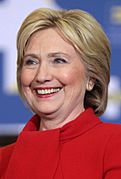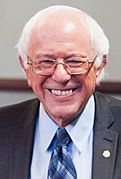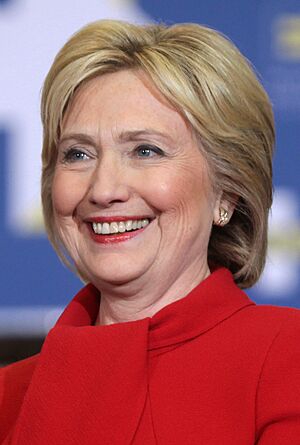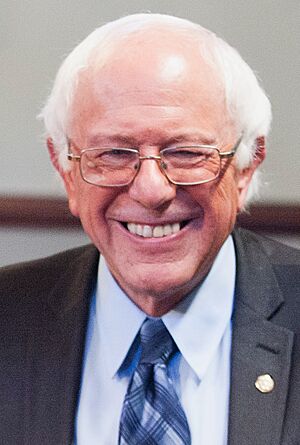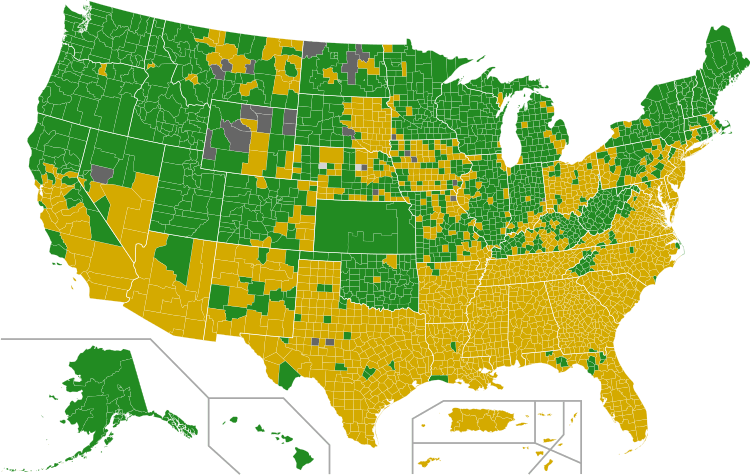2016 Democratic Party presidential primaries facts for kids
|
||||||||||||||||||||||
|
4,763 delegate votes to the Democratic National Convention 2,382 delegate votes needed to win |
||||||||||||||||||||||
|---|---|---|---|---|---|---|---|---|---|---|---|---|---|---|---|---|---|---|---|---|---|---|
|
||||||||||||||||||||||
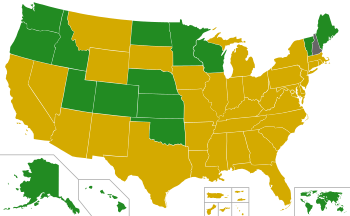
First place by initial pledged delegate allocation
|
||||||||||||||||||||||
|
||||||||||||||||||||||
The 2016 Democratic Party presidential primaries and caucuses were important events in the United States. They happened before the main 2016 general election. The goal was to choose the Democratic Party's top candidate for President. These events took place from February 1 to June 14, 2016.
The previous president, Barack Obama, who was the Democratic nominee in 2012, could not run again. This was because of rules about how many times a president can serve. These rules are part of the Twenty-second Amendment to the U.S. Constitution.
Contents
Choosing a Candidate: The Primaries
In the United States, political parties hold primary elections or caucuses. These are like early elections where people vote for their favorite candidate from their own party. The winner of these primaries then becomes the party's official candidate for the main presidential election.
Main Candidates for 2016
Several people wanted to become the Democratic Party's candidate in 2016. Two candidates were the most well-known and received the most votes.
Hillary Clinton's Campaign
Hillary Clinton announced she was running for president in April 2015. Before this, she had been the Secretary of State. She also served as a U.S. Senator for New York from 2001 to 2009. From 1993 to 2001, she was the First Lady of the U.S.. Many people thought she would be the top choice for the Democratic nomination.
Bernie Sanders' Campaign
On May 26, 2015, Bernie Sanders officially announced his run for president. He was an Independent U.S. Senator from Vermont. Sanders had also been the Mayor of Burlington, Vermont and a U.S. Representative for Vermont. His campaign became very popular, especially with younger voters and through social media. He was seen as the main challenger to Hillary Clinton.
Other Candidates
Some other candidates also ran for the Democratic nomination but later dropped out. These included Maryland governor Martin O'Malley, Rhode Island governor Lincoln Chafee, former Virginia senator Jim Webb, and professor Lawrence Lessig. They ended their campaigns before or early in the primary process.
Understanding Superdelegates
Superdelegates are special members of the Democratic Party. They are elected officials and members of the Democratic National Committee (DNC). Unlike regular delegates, superdelegates can choose to vote for any candidate they want at the Democratic National Convention. They do not have to vote based on the primary results in their state.
Superdelegates can change their minds about who they support at any time. They make up about one-sixth of all the delegates at the convention. The table below shows how many superdelegates supported each main candidate during the primaries.
| Distinguished party leaders | Governors | Senators | Representatives | DNC members | Totals | |
|---|---|---|---|---|---|---|
| Hillary Clinton | 10 | 16 | 39 | 166 | 247 | 478 |
| Bernie Sanders | 1 | 0 | 2 | 8 | 29 | 40 |
| Martin O'Malley | 0 | 0 | 0 | 0 | 1 | 1 |
| No endorsement | 9 | 5 | 6 | 19 | 157 | 196 |
| Totals | 20 | 21 | 47 | 193 | 434 | 715 |
Note: Some superdelegates, like those from Democrats Abroad, count as half-votes. This means they are worth 0.5 instead of 1 in the table above.
Results of the Primaries
The primary elections and caucuses took place across the United States. Voters in each state chose their preferred candidate. The map below shows which candidate won the most pledged delegates in each county.
After all the primaries and caucuses, Hillary Clinton won the most delegates. This meant she became the Democratic Party's official nominee for president. She then went on to run in the 2016 general election.
Related pages
See also
 In Spanish: Primarias presidenciales del Partido Demócrata de 2016 para niños
In Spanish: Primarias presidenciales del Partido Demócrata de 2016 para niños
 | Kyle Baker |
 | Joseph Yoakum |
 | Laura Wheeler Waring |
 | Henry Ossawa Tanner |


